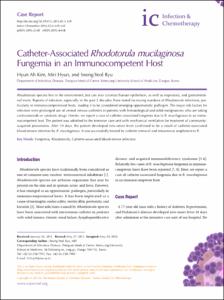KUMEL Repository
1. Journal Papers (연구논문)
1. School of Medicine (의과대학)
Dept. of Internal Medicine (내과학)
Catheter-Associated Rhodotorula mucilaginosa Fungemia in an Immunocompetent Host
- Keimyung Author(s)
- Kim, Hyun Ah; Ryu, Seong Yeol
- Department
- Dept. of Internal Medicine (내과학)
- Journal Title
- Infection and Chemotherapy
- Issued Date
- 2013
- Volume
- 45
- Issue
- 3
- Abstract
- Rhodotorula species live in the environment, but can also colonize human epithelium, as well as respiratory, and gastrointestinal
tracts. Reports of infection, especially in the past 2 decades, have noted increasing numbers of Rhodotorula infections, particularly
in immunocompromised hosts, leading it to be considered emerging opportunistic pathogen. The major risk factors for
infection were prolonged use of central venous catheters in patients with hematological and solid malignancies who are taking
corticosteroids or cytotoxic drugs. Herein, we report a case of catheter-associated fungemia due to R. mucilaginosa in an immunocompetent
host. The patient was admitted to the intensive care unit with mechanical ventilation for treatment of communityacquired
pneumonia. After 10 days, the patient developed new-onset fever confirmed to be a result of catheter-associated
blood-stream infection by R. mucilaginosa. It was successfully treated by catheter removal and intravenous amphotericin B.
Key Words: Fungemia, Rhodotorula, Catheter-associated blood-stream infection
- Publisher
- School of Medicine
- Citation
- Hyun Ah Kim et al. (2013). Catheter-Associated Rhodotorula mucilaginosa
Fungemia in an Immunocompetent Host. Infection and Chemotherapy, 45(3), 339–342. doi: 10.3947/ic.2013.45.3.339
- Type
- Article
- ISSN
- 2093-2340
- Appears in Collections:
- 1. School of Medicine (의과대학) > Dept. of Internal Medicine (내과학)
- 파일 목록
-
-
Download
 oak-aaa-02034.pdf
기타 데이터 / 643.4 kB / Adobe PDF
oak-aaa-02034.pdf
기타 데이터 / 643.4 kB / Adobe PDF
-
Items in Repository are protected by copyright, with all rights reserved, unless otherwise indicated.